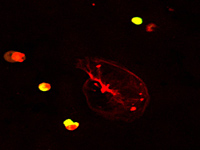|
||||||||||||||
| Microbiology and Immunology | ||||||||||||||

Microbiology is the study of the smallest forms of life namely, bacteria, viruses, archaea, fungi and protozoa. These fascinating organisms impact our lives in many ways. On the negative side, they cause disease in humans, animals and plants; they spoil our food. However, micro-organisms are also of great benefit as they contribute to a better environment via recycling of organic wastes, maintenance of soil fertility and biodegradation of pollutants. Many foodstuffs, beverages, pharmaceuticals and other products of biotechnology are products of microbial action.
Fundamental principles of Chemistry and Biology provide a foundation for the study of Microbiology, while broad range of courses and numerous areas of specialisation are offered in Microbiology to cater for the diverse interests of students. The study of Microbiology at UNSW also has an integrated focus on the important connections of this discipline with associated disciplines, such as Genetics, Immunology, Molecular Biology and Biotechnology. Immunology is a closely related field which looks at how the body fights off invasion by micro-organisms, and the ways vaccines protect us against disease. Immunology also looks at the genes which control immune responses, and at the many types of cells and molecules which cause both beneficial immune responses, and those not-so good ones such as asthma, allergy, transplant rejection and autoimmunity. Immunological discoveries have been used not only to improve treatment of infections and in allergy and transplants, but also in the fight against cancer and AIDS. Studying Microbiology and Immunology at UNSW The study of Microbiology and Immunology at UNSW is primarily through the School of Biotechnology and Biomolecular Sciences (www.babs.unsw.edu.au). At the undergraduate level, students can major in Microbiology within the Bachelor of Science, the Bachelor of Science (Advanced Science) and related combined degree programs. Please refer to the table below for a complete list. It is also possible to specialise in Microbiology and Immunology within the Bachelor of Medical Science.
Microbiology and Immunology can be studied as
|
||||||||||||||



